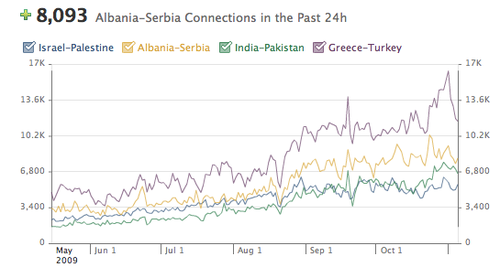At a recent birthday party I met a lady, who works for a charity that supports a children's cancer center in St. Petersburg. She proudly explained that the mortality had gone down from 80% to 20% in the past 10 years since her charity has been involved. We also spoke a lot about CISV, but I found it hard to come up with a similarly impressive figure, to pinpoint the results of CISV's work.
In an earlier post I already tried to outline the problem of "measurability". A lot of things in CISVs are just not measurable, like the effect of education, the true quality of a camp, the motivation of volunteers. A few years ago a study was done to see, what happened to all the CISVers we educated, and found that lots of them became teachers. Does that tell us anything? Measuring CISVs success by the percentage of participants going into the educational field? Obviously not. But how else can we measure our success?
Hans Rosling, my favourite "development statistician" explains how this problem also exists in Human Rights and Democracy.
(Sidenote: As in all of his talks, he draws a great conclusion: That democracy and human rights are not means to another goal (like health and wealth), but have values of their own.)
A rather new project by Facebook tries to measure world peace by the amount of friendships between nationalities that are politically "not-so-friendly":

Looks like friendship is growing everywhere, but I guess it's simply more Facebook users over time. Useful or not, an interesting indicator. (Maybe somebody can find a formula to extract CISVs impact on this data?)
While corporations simply measure their success in profits, CISVs output - awareness, attitutes, skills and knowledge - seems impossible to grasp. But, the fact that things are hard to measure, doesn't mean we should forget about it, but find pragmatic tools to rate our work. I think the much critisized PDPEF is one way to measure educational success. Certifying trainers is another way to monitor the spread of qualified trainers, as a quality indicator. Here at FTB I'm trying to find indicators for NA performance with the Balcony Index. For the future, we'll need even more tools to evaluate our work if we are serious in our mission for peace. And also, if we want to impress potential participants, leaders and sponsors.
Further reading:
GOOD magazine has some good takes on evaluation and measuring success in the non-profit world. Here's a starter that is part of a series of articles.
In an earlier post I already tried to outline the problem of "measurability". A lot of things in CISVs are just not measurable, like the effect of education, the true quality of a camp, the motivation of volunteers. A few years ago a study was done to see, what happened to all the CISVers we educated, and found that lots of them became teachers. Does that tell us anything? Measuring CISVs success by the percentage of participants going into the educational field? Obviously not. But how else can we measure our success?
Hans Rosling, my favourite "development statistician" explains how this problem also exists in Human Rights and Democracy.
(Sidenote: As in all of his talks, he draws a great conclusion: That democracy and human rights are not means to another goal (like health and wealth), but have values of their own.)
A rather new project by Facebook tries to measure world peace by the amount of friendships between nationalities that are politically "not-so-friendly":

Looks like friendship is growing everywhere, but I guess it's simply more Facebook users over time. Useful or not, an interesting indicator. (Maybe somebody can find a formula to extract CISVs impact on this data?)
While corporations simply measure their success in profits, CISVs output - awareness, attitutes, skills and knowledge - seems impossible to grasp. But, the fact that things are hard to measure, doesn't mean we should forget about it, but find pragmatic tools to rate our work. I think the much critisized PDPEF is one way to measure educational success. Certifying trainers is another way to monitor the spread of qualified trainers, as a quality indicator. Here at FTB I'm trying to find indicators for NA performance with the Balcony Index. For the future, we'll need even more tools to evaluate our work if we are serious in our mission for peace. And also, if we want to impress potential participants, leaders and sponsors.
Further reading:
GOOD magazine has some good takes on evaluation and measuring success in the non-profit world. Here's a starter that is part of a series of articles.

I wonder if Lebanese and Israeli CISV kids get in trouble if they have friends from the other country?
I do not know about the Israeli side, but I know that the law in Lebanon would get you in trouble for making such friendships. It has done us problems in the past, legal problems with the authorities that weren't nice at all.
It's great to have an open-minded CISV spirit, but It's kind of hard when you have a law that would accuse you of high treason and 25 years in jail.